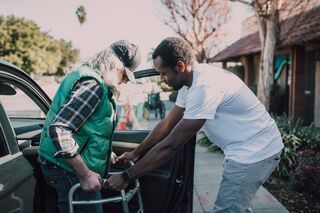Depression
How to Get the Help You Need
Tips on how to ask for help.
Posted March 30, 2022 Reviewed by Ekua Hagan
Key points
- Many people are not taught how to describe their problems or give advice, which can lead to failed attempts at support.
- One often receives better support if they tell others what kind of response they need before describing their problem.
- Before describing a problem to someone, it's okay to ask them not to give advice at all.

Have you ever needed help and gotten bad advice? Or have you ever asked for help and the person you’re talking to just started talking about themselves? Of course, you have. Talking about your problems and giving advice are both skills that no one is actually taught how to do, so people make mistakes when they try to guess what kind of support you want.
However, if you describe what you want the listener to do, you’ll skip the awkward pauses and get what you need out of the conversation. I’ll show you three examples of what you can say when you’re talking about your problems and I’ll teach you why these directions are helpful.
Say you want their support
“I’m really struggling with something and I need your advice” or “I’m really struggling with something and I need you to say it’s going to be okay.”
This frame gives the listener specific options and primes them to act. It’s similar to saying, “You’re going to take a left in 500 feet.” The listener always has the choice of whether or not they’re going to listen but you provide the best directions to get to the destination.
Ask them to just listen
“I have something important that I want to tell you and I just want you to listen. You don’t have to tell me it’s going to be okay, problem-solve, or give me advice.”
There is a time and a place to ask for the exact opposite of the first example. When you’re dealing with a problem and you just want the listener to be aware of it, you can invite them to simply listen. It’s like asking someone to come along for a ride with you. They don’t have to know how to get where you’re going or why you’re going; you just want their company.
Invite questions
“I just got some really bad news and I don’t know what to do about it. Can you ask me some questions so I can think it through?”
This strategy is best when you need feedback about a problem, especially something that neither you nor the listener has been through before. When you come to a fork in the road, you have a choice in front of you with pros and cons to both sides. Sometimes you need help thinking through which path has the best chance of getting you where you want to go.
The people around you are there to support you but they aren’t mind-readers. They only know how to help if you tell them how to help you. The bigger the problem, the more help you’ll need to get to the destination. The journey is always easier with good co-pilots.


